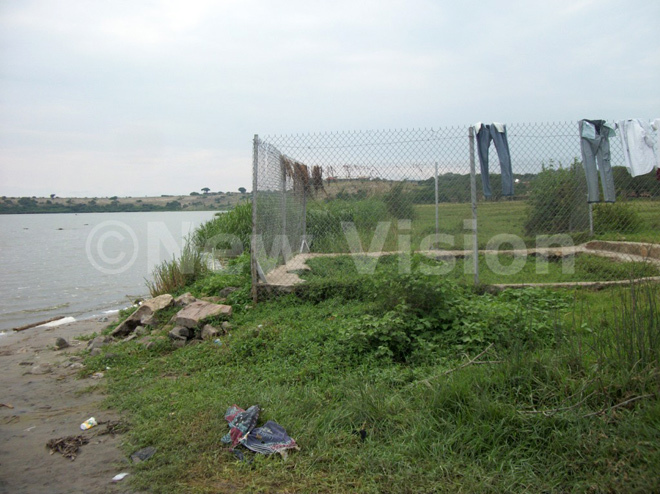Kasese residents in panic over crocodile attacks
The crocodiles lie in ambush along the village paths and pounce on the residents of Katwe village as they walk to fetch water, go to the market or children going to school
Children fetching water from the lake. Such children are now prone to crocodile attacks
Joshua Baluku,7, sobs uncontrollably as he looks across the compound to the bank of Lake George, in Katwe village.
He was orphaned last month when a crocodile killed his mother as she was taking his nine-month old sister to a health centre for immunisation.
The early morning attacked happened a kilometre away from home, but next to Baluku's school, which is located a few metres away from the shores of lakes George and Edward.
"A woman made an alarm and we ran out of class. When I saw the baby clothes and the bag, I knew it was my mother. Only her leg was spared," says Baluku amidst sobs.
Betty Mbambu, 36, a farmer and resident of Kyakitale in Katwe town and her child did not survive either. The crocodiles attacked them early in the morning when Mbambu was taking the child to the health centre.

The water cages where residents used to fetch water away from the crocodiles have now dried up
The residents now live in fear following the increasing cases of attacks.
The crocodiles lie in ambush along the village paths and pounce on the residents of Katwe village as they walk to fetch water, go to the market or children going to school. Every member of the village is virtually a victim, any given time
People living around the lake shores in the sub-counties of Muhokya, Lake Katwe and Katwe-Kabatooro town council said that the crocodiles have started invading their homes and gardens in search of food.
The crocodiles brought in the area by Uganda Wildlife Authority 10 years ago have since multiplied and are invading homes and gardens in search of food.
Last week, Innocent Masereka, a 14-year-old pupil at Kahendero fish landing site was eaten by a crocodile as he was going fetch water. His head was found on a small island near the landing site.
"Crocodiles have increased in numbers and they do not have food so they have now resorted to invading our homes and gardens in search for food recently a woman was rescued from the jowls of the crocodile as she was cultivating in Katwe," Muhamad Amri a fisherman in Kahendero says.
Fred Muhumuza, a fisherman says several residents are nursing injuries as a result of crocodile attacks and says they should be captured and relocated.
He says that over 12 people were killed by the crocodiles last year and others are not known by the residents since some are fishermen from Democratic Republic of Congo.
"It is common to find the remains of people floating on the waters because of the attacks by the crocodiles and of recent the crocodiles have increased in numbers," says Muhumuza.
He says the incidents have created panic among the fishermen with some abandoning the activity in fear for their lives.
Jesca Biira, 41, a resident of Kahendero fishing village who was widowed in January 2017, after a crocodile attacked his husband as he was fishing recalls the nasty incident.
"My husband Steven Mwesige went fishing on January 14. That was the last time I saw him alive because in the evening I received the news that they had recovered his head floating on one of the islands in the lake," she says.
She says that since then she has been finding it difficult to care for the six children since they depended on fishing as their main source of income.
"Life has completely changed. Three of the children are out of school. I cannot afford to pay their school fees," Biira says.
Jackson Musinguzi, a marine Police officer attached to the landing site said on Monday during a crisis meeting at Katwe landing site that they are getting in touch with Uganda Wildlife Authority to help Police to relocate the deadly crocodiles from the area.
He says that many cases of crocodile victims go unreported as some of the people are unknown in the area.